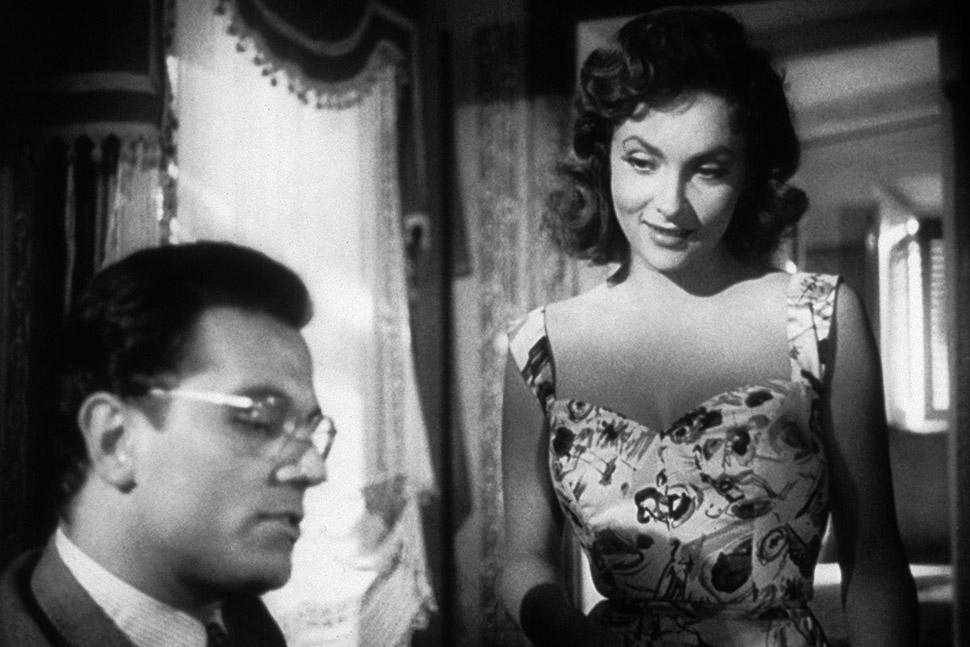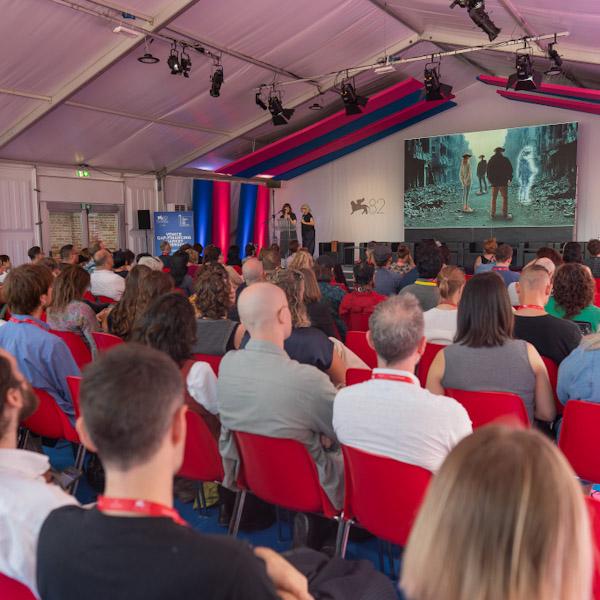
Pre-opening night of the 80th Venice Film Festival dedicated to Gina Lollobrigida
The programme will feature Portrait of Gina (1958) by Orson Welles and La provinciale (1953) by Mario Soldati on Tuesday 29 August, 9 pm, in the Sala Darsena at Venice Lido.
Pre-opening night of the 80th Venice International Film Festival
The Pre-opening event of the 80th Venice International Film Festival (30 August – 9 September 2023) directed by Alberto Barbera will be dedicated entirely to the great actress Gina Lollobrigida, the icon of Italian cinema who passed away in January.
A double-feature screening will take place in the Sala Darsena (Palazzo del Cinema) at the Lido di Venezia starting at 9:00 pm:
- Portrait of Gina (1958, 27’) by Orson Welles, presented as a world premiere in collaboration with Cinecittà, restored by Filmmuseum München.
- La provinciale (1953, 113’) by Mario Soldati, presented as a world premiere, restored by the Centro Sperimentale di Cinematografia-Cineteca Nazionale, in collaboration with Compass Film.
The two films are part of the Venice Classics programme of the 80th Venice International Film Festival and are part of the initiatives dedicated to the great actress Gina Lollobrigida promoted by the Undersecretary of Culture Lucia Borgonzoni and the President of Cinecittà Chiara Sbarigia. A project that also includes two photographic exhibitions in Rome and Venice and an award for young talents, which will be presented during the Venice Film Festival.
Portrait of Gina (1958) by Orson Welles, a fully completed pilot for a television series about “people and places” with Orson Welles as guide. Long thought to be lost, the film is an interview by Welles to Gina in her villa on the Appia antica. The film remained undiscovered until 1986, when it was screened at the Venice Film Festival, one year after Orson Welles’ death.
“In fact, it’s not really a documentary at all, but an essay, a personal essay. It’s not trying to be factual, it’s simply not telling lies. It’s in the tradition of a diary, my reflections on a given subject, Lollobrigida, and not what she is in reality. And it’s even more personal than living my point of view; it truly is an essay”. (Orson Welles, 1958)
La provinciale (The Wayward Wife, 1953) by Mario Soldati, is a literary drama about a woman, adapted from the eponymous novel by Alberto Moravia with a screenplay written by the director himself. Gina Lollobrigida, in the role of the main character Gemma, offers one of the finest performances of her career. The original camera negative was used to restore the film, integrated with a dupe for some of the missing or damaged frames. A dual-band soundtrack positive preserved in the archives of the Cineteca Nazionale was used for the soundtrack.
Portrait of Gina
This is one of Orson Welles’ most unusual projects, a report that focuses on the great American director in Rome as he interviews Gina Lollobrigida as well as other personalities of Italian cinema such as Vittorio De Sica, Rossano Brazzi, Paola Mori and Anna Gruber, Lollobrigida’s lifelong friend.
“It was about the Roman movie world. She was the leading subject, but a lot of other people were in it – De Sica and so on. The film was made as a pilot for ABC of a proposed series, a sort of magazine – a serious one, not variety. And they hated it and that was the end of that. They said it was technically incompetent and couldn’t be shown. Had a lot of new ideas in it – done with Steinberg’s drawings, many still photos, conversations, little stories – and they regarded that as technical incompetence. I spent a lot of time photographing movie posters. That bothered them, too. It was made for that screen (TV), in the newspaper tradition”. (Orson Welles, 1970)
La provinciale (The Wayward Wife)
Synopsis
Gemma (Gina Lollobrigida), a working-class girl whose mother (Nanda Primavera) runs a boarding house, is in love with a wealthy young man, Paolo Sartori (Franco Interlenghi). But she cannot marry him because he is her illegitimate half-brother. She gets over her disappointment and resigns herself to marrying Professor Franco Vagnuzzi (Gabriele Ferzetti), for whom she has no real affection. Blackmailed by Countess Elvira (Alda Mangini), Gemma becomes the lover of a certain Vittoni (Renato Baldini). Franco does not suspect anything. When Elvira threatens to follow the couple to Rome, where Franco is about to be transferred, an exasperated Gemma strikes at the woman and injures her. She succeeds in driving her away and is reconciled with Franco.
«To make La provinciale the way I wanted to, I had to fight to the death with the producer […]. Our quarrel was about this: there were two approaches to choose from […]: one had been developed by a French screenwriter who had also made some very good movies […]. Provinciale was well developed, but rather routinely, and the character of the girl’s husband was exactly as Moravia viewed him, an elderly, sentimental and romantic type. The other was mine with Bassani. I told him: “I’m making mine and I’m not making F.’s”, and the producer said: “no, I’m making F.’s, and I’m not making yours, otherwise, I’m not making the movie” so I answered: “All right then, we’re not making the movie”» (Mario Soldati)
Gina Lollobrigida -
Biography
Gina Lollobrigida (July 4th 1927 – January 16 th 2023) participated in the Venice International Film Festival many times with her films or as a guest. The first time was in 1950 when she presented three movies: Campane a martello and Cuori senza frontiere by Luigi Zampa, and La sposa non può attendere by Gianni Franciolini. In 1952 was the protagonist, alongside Vittorio De Sica, of the famous episode Il processo di Frine in the movie Altri tempi by Alessandro Blasetti. The film was selected for the opening ceremony. In 1954, as the protagonist of La romana by Luigi Zampa, Gina arrived on a carriage for the screening accompanied by Alberto Moravia. For this occasion Italo Calvino wrote on “Cinema nuovo” that Gina was “the heart of the film, its first reason, prestige and pride of the producers and of the fanatical public, who almost overwhelmed her in front of the Palazzo del Cinema because of their enthusiasm”.
“When Igor Stravinskij came, no one recognized him”. This is the incipit of a 1956 article by Oriana Fallaci published on “l’Europeo” and dedicated to Gina Lollobrigida and to her great popular succes as guest of the Lido, with an audience of fans waiting for her for hours outside the hotel and Palazzo del Cinema.






